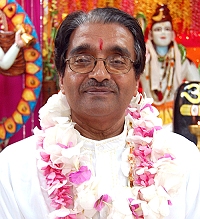From a satsang with the Shankaracharya of SWAHA, H.H. Pt. Hardeo Persad
As we proceed along this journey of life, each of us is responsible for ourselves and our actions. The ancient advisor, Chanakya Maharaj, offers these words of wisdom on this subject:
“A man is born alone into the world and meets his end alone. Alone he bears the consequences of his good or evil actions; alone he suffers; and alone he attains the ultimate state.”
Humans are considered ‘social animals’; we are gregarious by nature and usually enjoy associating with each other. This social aspect is present in all activities of life. Yet still, we must remember that we are essentially alone. There is a saying: “If I have a friend, it is my shadow, but under some conditions, we cannot even see our shadow.” Living in this world of changeability, it is a truth that we must come to terms with the fact that nothing is permanent and everything is temporary or transient. All relationships and objects must one day come to an end. In addition, others might be able to share some of our joys and sympathize with our pains, but they do not really experience those emotions for us. In that sense, we are each on our own.
While we are influenced by the external world, its impact on our thoughts and behaviour is less powerful if we have, instilled in us from a young age, the determination to tread the righteous path and focus on the positive and uplifting in life. Thus, our early influences in life are extremely important. For example, Prahlad, the great devotee of Bhagavan, while in his mother’s womb, was indoctrinated by Narad Muni. When he was born, his father tried to influence Prahlad to worship him as the Supreme, but to no avail, because Prahlad’s mind was already formed in the womb. In the formation of the mind, even pre-birth influences are important, particularly the thoughts and emotions of the pregnant mother. The spiritual foundation, formed during the process of growing up, is also essential to leading a life of spirituality and righteousness.
In addition to all these external influences, personal choices, and karma, time is also of the essence in determining who we are. It is said that “time devours beings and destroys the creation. Time remains active even when the beings are asleep. No one can check its incessant flow. Time is all powerful. Time is ever active. It is ruthless in continuing even if we may be asleep, or even if we are not conscious. Time continues to flow. All are helpless before time.”
Essentially, it is the combination of external influences, time and our personal choices that will determine who we are in life. Thus, we must each take responsibility for our life. We are the creators of our own destiny. We must realize that, in this existence, there is the world and there is my world. Let me take responsibility for my world. In the final analysis, I am alone in life. When I leave this life, I carry only my karmas with me. As we journey through life, we must realize that there are only two seeds that we can plant: sin or virtue, that blossom into either destruction or liberation. Let us choose wisely. The personal choices we make in life determine our destiny. Let us make the choices that will advance us on the righteous path of spirituality.



